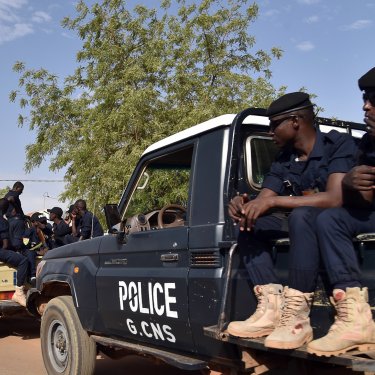Witchhunt in Niger

Yesterday a prosecutor questioned the three journalists who were arrested for publishing documents in the newspaper Le Courrier that reflected badly on leading members of Niger society. He ordered that two of them, the newspaper’s owner, Moussa Dodo, and its editor, Ali Soumana, should be detained pending trial.
RSF is of the view that the prosecutor clearly violated the right to freedom of information because he based his decision on Niger’s penal code instead of its press law. Dodo and Soumana have been charged with “divulging documents seized during a search and bringing discredit on a judicial decision.” Soumana Idrissa, the printer, was released but has been charged with complicity.
***********************************************************************
Reporters Without Borders calls for the immediate release of three journalists who have been arrested for publishing information involving leading members of Niger society although the information was already in the public domain because it was submitted as evidence in a court case.
The three journalists are Ali Soumana and Moussa Dodo, owner and editor of Le Courrier, the newspaper that published copies of the documents submitted in evidence, and Soumana Idrissa Maiga, the owner of the printing company that prints Le Courrier.
Soumana and Dodo have been held since 4 June on a charge of “publishing documents.” Maiga, who owns his own newspaper as well as a printing press, has been held at the headquarters of the judicial police since yesterday evening on a charge of “printing Le Courrier.”
The police are still questioning Soumana and Dodo in an attempt to identify their sources. Their homes were searched the day they were arrested.
Published in Le Courrier on 19 May and 2 June, the documents were copies of requests by leading members of Niger society to the director for hiring at the public health ministry asking him to ensure that their relatives or protégés succeeded in the competitive examination that all job applicants must take.
The documents were produced as evidence in the fraud prosecution brought against the civil servants involved in the scandal. Those who allegedly tried to influence the results of the entrance exam include the First Lady, the president of the constitutional court, the armed forces chief of staff and the oil minister.
“This persecution of journalists who just did their job is intolerable,” RSF said. “The documents concerned were already in the public domain because they were produced as part of an ongoing investigation. The authorities are bringing discredit upon themselves by hounding journalists like this. They are also violating Niger’s press law.”
Under the press law, the judicial authorities may only take action against a newspaper’s printer when its owner or editor is unavailable. But in this case, the authorities have holding the owner and editor since 4 June. The same law also prohibits detaining journalists for press offences.
Niger is ranked 52nd out of 180 countries in RSF’s 2016 World Press Freedom Index. Mahamadou Issoufou’s election as president in 2011 had raised hopes of an improvement in respect for media freedom but certain government officials now seem to be cracking down.



